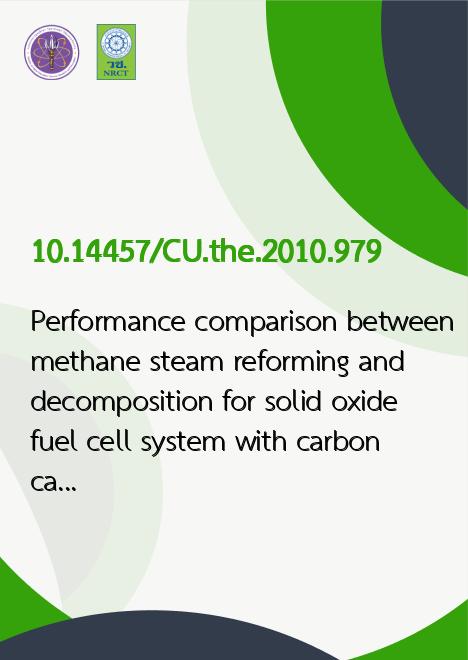
|
Performance comparison between methane steam reforming and decomposition for solid oxide fuel cell system with carbon capture |
|---|---|
| รหัสดีโอไอ | |
| Title | Performance comparison between methane steam reforming and decomposition for solid oxide fuel cell system with carbon capture |
| Creator | Narisra Triphob |
| Contributor | Suttichai Assabumrungrat, Tawatchai Charinpanitkul |
| Publisher | Chulalongkorn University |
| Publication Year | 2553 |
| Keyword | Fuel cells, Solid oxide fuel cells, Renewable energy sources, Steam, Methane |
| Abstract | To propose the alternative hydrogen production of methane decomposition (MD) as a fuel processor to replace methane steam reforming (MSR) in the conventional solid oxide fuel cell (SOFC) system. In this work, comparison between the MD integrated with SOFC (MD-SOFC) and the MSR integrated with SOFC (MSR-SOFC) was performed in terms of SOFC performances and economic to demonstrate a benefit of using MD as a fuel processor. The performance analysis of SOFC system is evaluated based on thermally self-sufficient condition where no external energy is required for the system. Although the MD-SOFC system offers lower overall electrical efficiency than that of the MSR-SOFC as solid carbon is generated without being further combusted to generate energy; however, the MD-SOFC stack can be operated at higher power density due to high purity of hydrogen supplied to the fuel cell, resulting in higher stack cell electrical efficiency and smaller size of the system when compared to the MSR-SOFC. Moreover, the MD-SOFC system is less complicated and lower energy requirement than that of the MSR-SOFC as the CCS facility is not necessary to be included to reduce CO2 emission. Economic analysis demonstrated that the SOFC system with MD is more competitive than the conventional system with MSR when considering the valuable by-products of solid carbon even with the low valued carbon black. Finally, it is recommended that the success of this proposed SOFC system with MD relies on the technology development on cogeneration of hydrogen and valuable carbon products. In order to achieve the higher overall electrical efficiency, the carbon product may be utilized to generate additional electrical power using direct carbon fuel cell (DCFC) |
| URL Website | cuir.car.chula.ac.th |